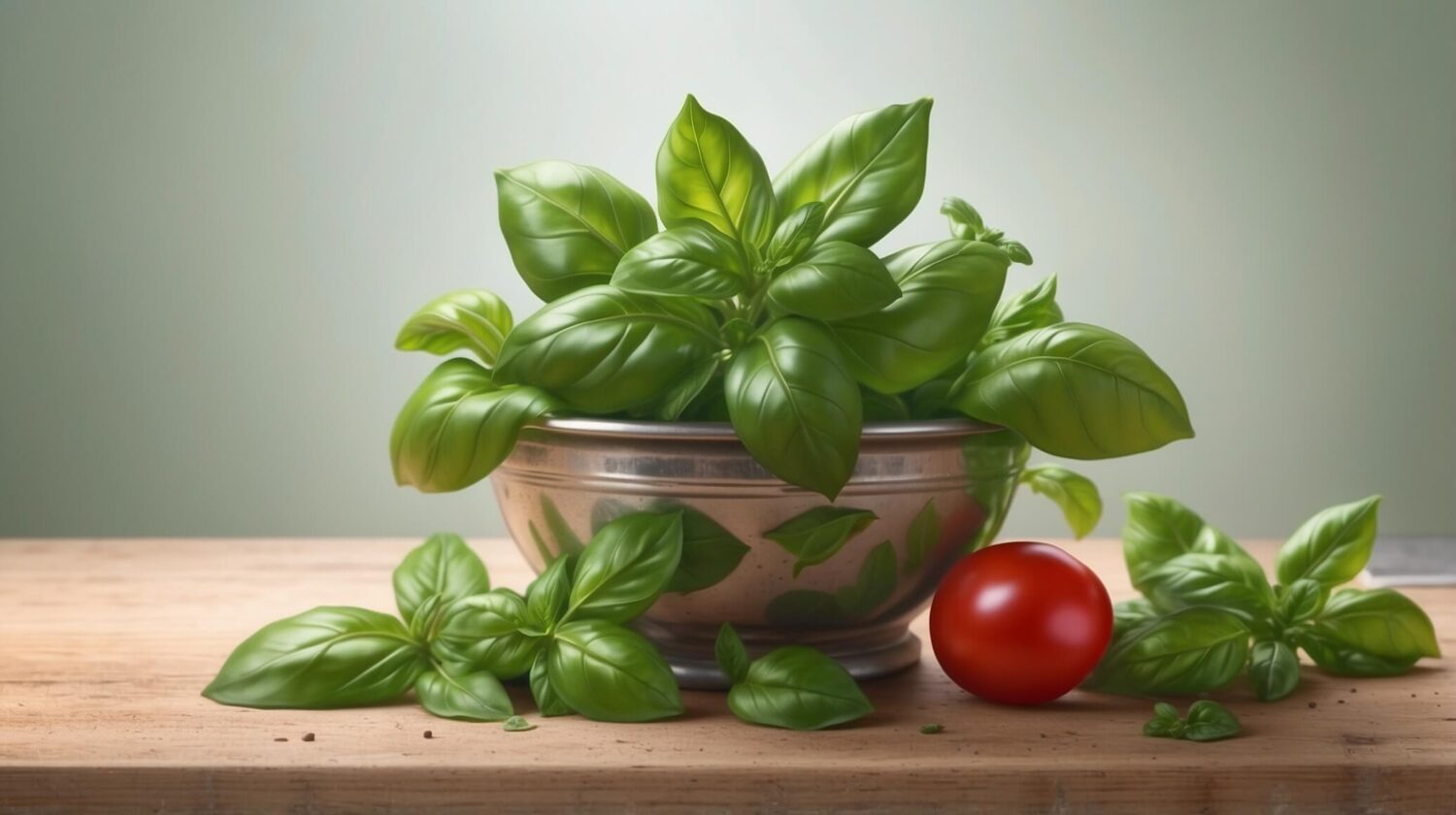Basil, often called the king of herbs, isn’t just a popular culinary ingredient—it’s packed with countless benefits for your health and well-being. From enhancing the flavors of your favorite dishes to providing numerous Basil benefits, this beautiful green herb deserves a spot in your kitchen and garden. Let’s dive deeper into the extensive benefits of basil and see how it can make a positive impact on your life.
The Nutritional Power of Basil
Before we delve into specific basil health benefits, let’s take a quick look at what makes basil so special nutritionally. Basil is low in calories yet rich in vitamins and antioxidants. According to the U.S. Department of Agriculture (USDA), one tablespoon of fresh basil contains shining amounts of vitamin K, manganese, iron, and calcium, along with healthy essential oils.
The fact that it is nutrient-dense means you don’t have to eat much of it to reap the benefits. So, why not add a few leaves to your meals? You’ll be surprised at how delicious it makes your food!
1. Antioxidant Properties
One of the most notable benefits of basil lies in its antioxidant properties. Antioxidants help fight oxidative stress caused by free radicals in the body. Such stress has a hand in various chronic diseases.
According to a study published in the *International Journal of Food Sciences and Nutrition*, the essential oils found in basil, like eugenol and linalool, play a significant role in combating oxidative damage (source: NCBI). By adding basil to your diet, you’re not just enhancing flavor; you’re also taking a step toward maintaining cellular health.
2. Anti-Inflammatory Effects
Just like any good piece of evidence in court, inflammation can be quite the suspect. Chronic inflammation is tied to many serious health issues, including arthritis, heart disease, and even cancer. Basil comes to the rescue here.
Research has pointed out that compounds in basil can reduce inflammation. For example, a study revealed that basil extracts can inhibit the production of pro-inflammatory substances (source: Journal of Medicinal Food). Adding fresh basil to your meals can help minimize the likelihood of inflammation ruining your day!

3. Stress Relief and Mood Enhancement
Now, we live in a fast-paced world. Sometimes life can feel a bit chaotic, right? This is where the basil health benefits really shine. The aroma of basil can elevate your mood and reduce stress. The lovely scent can act as an adaptogen, a substance that helps the body adapt to stressors.
When I was feeling a bit overwhelmed last month due to work pressure, I decided to brew a cup of basil tea. It was refreshing. I felt calmer, and believe it or not, it didn’t stop me from finishing my work.
4. Promotes Digestion and Gut Health
Let’s talk about our wonderful digestive system. Having a happy gut is essential for overall health. It can be super aggravating to have an upset stomach. The good news? Basil can play a role in promoting better digestion.
Some studies indicate that basil possesses carminative properties, which means it can help relieve gas and bloating (source: National Center for Complementary and Integrative Health). When I make pesto, I always like to add a healthy dose of basil. Not only does it taste amazing, but it also helps my tummy feel more at ease when I’ve indulged a little too much.
5. Disease Prevention

The benefits of basil extend into the realms of disease prevention. Regularly incorporating basil into your diet can reduce the risk of certain illnesses.
According to Ayurveda, basil, particularly the holy basil variety (Ocimum sanctum or Tulsi), is known for its immunity-boosting effects (source: PubMed Central). It can aid in the protection against infections and illnesses. With the flu season approaching, it might just be the perfect time to embrace those vibrant green leaves!
6. Supports Heart Health
Heart health is something we should pay close attention to. Basil may help lower blood pressure and improve overall heart health. Some studies have shown that eugenol, an oil in basil, may help lower cholesterol levels, thus reducing your chances of heart-related ailments (source: BMJ).
Since heart disease runs in my family, I find it crucial to keep an eye on my intake of heart-friendly foods. Basil has certainly become a staple in my salads and pasta dishes. You should give it a try; it could make a difference for you too!
7. Natural Antimicrobial Properties
If there’s one thing we all learned recently, it’s the importance of keeping our environment clean. Luckily, basil has been shown to possess antimicrobial properties that can help tackle various bacteria and some viruses (source: Journal of Agricultural and Food Chemistry).
I was pleasantly surprised to find that adding basil to my sauces not only gives color and taste but also adds an extra layer of protection. Feeling good knowing I’ve infused something wholesome into my meals makes cooking even more rewarding!
8. Aids in Skin Health

It’s not just what we eat or drink that makes a difference; it’s also what we put on our skin. The benefits of basil include natural skin health improvements. Rich in antioxidants which combat skin degeneration, basil can also fight bacteria that cause acne and other skin conditions.
Once I had an itchy rash that just wouldn’t quit. After doing a little research, I created a soothing basil paste with coconut oil. I applied it directly to my skin and was astounded how effective it was! Not only did the itch subside, but my skin felt rejuvenated afterward.
9. May Help Regulate Blood Sugar Levels
For people keeping an eye on their blood sugar, basil might be a useful ally. Some studies indicate that basil may lower fasting blood glucose levels (source: Journal of Complementary and Integrative Medicine).
While I don’t personally face blood sugar issues, I make sure my parents include basil in their meals, especially as they age. It’s all about prevention, right? Their morning smoothie with a sprinkle of fresh basil has turned into our family’s little vitamin boost.
10. Culinary Delight
Last but not least, the best part—the culinary applications! Let’s face it; the fresh, aromatic flavor of basil pairs well with so many dishes. From pasta sauces to salads, and even desserts, basil lends a vibrant taste that elevates meals to another level.
Whether I’m whipping up a classic Caprese salad, tossing together a homemade pizza, or infusing oils, basil finds its way into my kitchen regularly. The joy it brings is almost palpable!
How to Add More Basil into Your Life
So, you might be wondering, *how do I incorporate more basil into my meals and reap its benefits?* Here are a few tips to get you started:
Fresh Basil in Cooking
– Toss fresh basil leaves into your pasta sauces as they simmer. Not only will you infuse flavor, but the nutritional benefits will be top-notch!
– Make homemade basil pesto for a zesty spread or pasta sauce. It’s simple: blend basil, garlic, nuts, parmesan cheese, and olive oil.
– Add fresh basil to salads and sandwiches for a refreshing touch.
Basil Tea for Relaxation
We talked about many amazing basil health benefits, so how about a calming cup of basil tea? It’s simple to make: steep fresh basil leaves in hot water for a few minutes, sweeten it as you like, and enjoy.
Growing Basil at Home
If you have a green thumb, consider growing your own basil. It’s a straightforward herb to cultivate, whether in a pot on your patio or a small garden patch.
When you grow your own, the feeling of plucking those fresh leaves is incredible—plus, the flavorful impact enhances your cooking flawlessly!
Final Thoughts on the Benefits of Basil
As we wrap up this exploration of the benefits of basil, I hope it’s evident just how extraordinary this humble herb can be. Whether you are looking to boost seasonal flavors in meals or searching for ways to improve health and wellness, basil has a wealth of advantages to offer.
Have you tried infusing basil into your routine? Or maybe you have a killer recipe featuring basil? If not, now might just be the perfect time to start!
For more in-depth research, grounding adjustments in your diet is always a wise move. It’s about finding what fits your lifestyle and needs. So go ahead, and let this special herb add some flavor and health to your world!
—
Sources:
1. National Center for Complementary and Integrative Health. NCCIH
2. Journal of Medicinal Food. PubMed
3. Journal of Agricultural and Food Chemistry. ACS Publications
4. US Department of Agriculture. USDA
5. International Journal of Food Sciences and Nutrition. NCBI
6. Journal of Complementary and Integrative Medicine. DOI
7. BMJ. British Medical Journal
